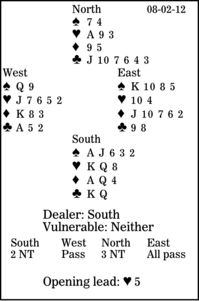Bridge column, August 2: The rule can offer surprise assistance

Real estate mogul Barbara Corcoran said, "I sat down and collected all of our 11 sales for the past six months and I added them together and divided by 11. I then took that average and presented it as the average price for a Manhattan apartment. The media ate it up."
In bridge we have the Rule of Eleven. Subtract the value of a fourth-highest lead from 11 and you know how many cards higher than the one led lie in the other three hands combined.
Look at this deal. South is in three no-trump. West leads a fourth-highest heart five. Declarer takes East's 10 with his king and wins the next two tricks with his club honors, West correctly holding up his ace. How should South continue?
South was right to open two no-trump, despite the five-card major and unappealing club holding. The hand was too strong for one spade and too weak for two clubs. North was correct to bid three no-trump. It was unlikely that five clubs would make and three no-trump fail.
Applying the Rule of Eleven, South knew that East had only one heart higher than the five: the 10 he played at trick one. And declarer needed two dummy entries: one to establish the clubs and one to get to those winners. At trick four, South led his heart eight and overtook it with dummy's nine. Then came the club jack. West won and had no riposte, with the heart ace still in the dummy. Declarer took one spade, three hearts, one diamond and five clubs.
And, yes, West should have seen this coming and played his heart jack on South's eight to kill the second dummy entry and the contract.
** ** **
COPYRIGHT: 2012, UNITED FEATURE SYNDICATE
DISTRIBUTED BY UNIVERSAL UCLICK FOR UFS

